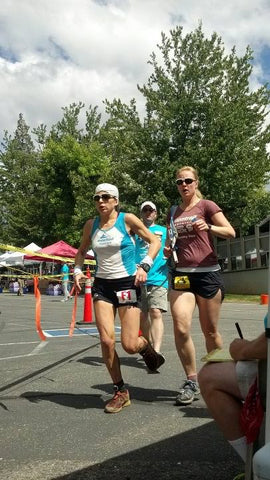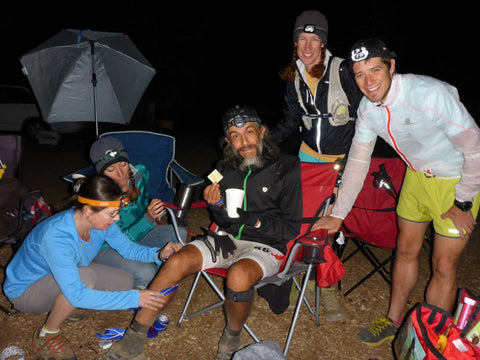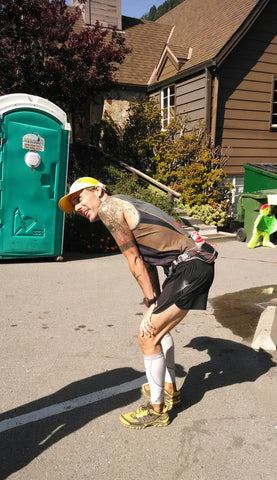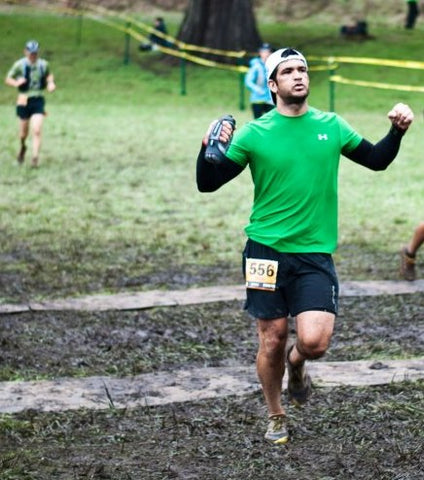The heART of pacing.

Not too long ago I had an interesting conversation... Alright, it was actually a friendly argument with one of my old San Francisco Running Co. cohorts about pacing. Specifically between the approach of pacing from behind, or up in the front. Without getting into the details of our discussion, it dawned on me that I had a very strict, defined, and almost dogmatic perspective on the subject.
First off, what really is pacing? To me, simply put: it's a changing flow of movement. With most things in life, I never look up definitions. I just make it up as I go along. Sure, this gets me into trouble sometimes, but it also keeps things loose and open to interpretation. Yet, with the experience of many miles and hours pacing folks at tons of Ultra events, I've tightened up my opinion that there actually is a "best" method to pacing a runner, which specifically speaks to the sport of Ultrarunning. In addition, I've found that being a pacer is more than just moving with the flow of your runner. It's about wearing the multiple hats of a storyteller, coach, motivational speaker, physical therapist, mathematician, nutritionist, comedian, weather person, athlete, and ultimately... parent.
When I think of short to middle distance events, like track up to the Marathon, I understand the concept of having someone pace from the front. It's about setting that flow of movement and locking it in for the duration of the race. In most cases there's not a lot of time for your flow to break down dramatically. Things like form and mental fatigue are always going to suffer to a degree, but relative to loooong distance events.... Up the ante, and things change a bit.
That being said, pacing from behind (or, in some moments slightly behind and to the side, as seen in some of the photos) is my go-to position. It may seem like a no-brainer to you, but I've seen a fair number of "pace from the front" combos at ultra events, and when comparing the two, it's easy to see why I find the prior more favorable to the latter. In an ultra setting, front pacing offers up a few dilemmas. Your runner has trained their pace into their system. By leading, you ultimately pressure them into following you, not their trained ability and instinct. Most importantly, by leading, you have no visual connection to your runner, which in essence greatly diminishes your ability to take care of them.
Basically, seeing your runner ahead of you gives you the opportunity to check their form and disposition. Are they listing to one side or hunching over? Are they starting to drag one, or both of their feet? Are they noticeably slowing down, when the terrain is still fairly runable? Are they eating and drinking? Have they suddenly, and quietly, dropped to the ground in fetal position to begin a long and painful dry heave? I don't know about you, but as cool as it would be, I don't have eyes in the back of my head to see my runner's progress. So what do you do if you notice any of the things I've mentioned?
Erika Haogland on her way to a Western States top 10 finish.
Let's back up a bit, to before you even hit the trail. Even if you're not part of the crew, as a pacer, you are a moving crew member. It's not mandatory that you help crew your runner from the start of the race, but it helps a ton. At the least, you should keep close tabs on their early progress prior to picking them up and joining them. By doing this, you are dialed into the reality of where they're at. I also like to be privy to their pre-race plan, or what I like to call: paper reality. What, and how often, will they eat? What will they eat when, or if, their chosen nutrition turns sour on them? Will I need to entertain them with conversation, or do they prefer to move in silent unity. Do they have a best/worst case finish time planned out? How does the overall finish time pace look in a realistic sense? What do they want to get out of the event? Is it a training race? Is it an 'A' race? Most importantly, What is the temperament/personality of your runner? This is super tricky when you graciously jump into pacing someone you don't know, but I'll get into that later.

Pacing Thomas Reiss at Miwok 100k.
Everything on my lists is about flux. The longer the race, the more opportunities for things to change, the more necessity for all involved to be open to change. One minute you might be telling a funny story about being in a play, then the next you're being told to "Shut up!" followed by, "This race is so stupid!" Of course you don't have to take verbal abuse, and that goes both ways. Just remember, IT'S ALL ABOUT YOUR RUNNER! In this context, you find yourself taking on the role of the strong, nurturing parent. And as a good parent, you wear your many hats take care of your runner/child, as any good parent would. When you see a change in their form, you throw on the physical therapist hat, and question whether it's an issue to address, something to keep an eye on and address later if it worsens, or simply a product of the running a long freakin' way. When you're arriving at an aid station, take charge of what will be needed there. Have all water bottles ready for refill, and make sure to keep the stop brief. If they're running slow on a nice runable stretch, again, you determine if it's fatigue and the pace is ok, or if they're just doggin' it, in which case you encourage them to pick it up a little. On the opposite side, you also need to know when they're draining the well, and tell them to slow the f down. Which is often the hardest thing for a runner/child to do, and a pacing/parent to dictate, but this is where some of the art of pacing really starts to come into play. As the coach, you expound on the mechanics of efficient leg turnover for a stronger finish. As motivator, you tell them how awesome they are in the moment, and that saved energy is money in the bank. As the mathematician, you recalculate splits in your head to gauge where your running reality is, as opposed to the paper reality. If things are clicking along in a positive way, sweet. If things are slowing down in the negative, then you play the 'Goal Game'. My father use to play this with me when I was a kid, to pass the time, and it's still as effective today... Let's finish under xx hours. Let's stop for only one minute at the aid station. Let's run the flats. Let's see if we can catch people. Let's make it to that tree. Let's throw up if you have to.

Ellie Greenwood, with pacer Ryne Melcher, on her way to winning Western States 100, 2012
And on that note, if sour stomach is an issue, this is when you put on the most complicated hat to wear.... The hat of the nutritionist. It requires you to asses what particular food and/or food/drink combo to overall physical exert, might be causing the tummy troubles. Sometimes it requires a death march to the next aid station. At which point, you take time to figure out and get in the tolerable nutrition, while dumping everything that your runner thought was their go-to for getting through the race. Sometimes, taking time is only five minutes, sometimes it's an hour. Sometimes it's walking out of the aid station until they feel like running again. In this scenario, keep in mind, a person feeling sick (not to mention tired) is vulnerable. Your patience and nurturing energy go a long way to getting back on track.
Taking a moment to sit for a few can be a huge help to reboot the system. You need to be the best judge of what's the right amount of time, and what's too long. If sleep is the answer, try to plan for no more than a 15 minute cat nap. Usually, anything more will leave your runner slightly groggy, and not as energized. It's pretty amazing how a tired mind and body responds to a quick nap. There's a secret trick I learned from a few ultra legends that involves getting your runner to quickly sleep and move on, but, unfortunately, I'm bound by secrecy and can't tell you. Anyway, you might use it on me if I'm ever employing your pacing skills. ;-)

Getting a reboot at the inaugural Tahoe 200 by pacers (Gretchen Brugman, and Luke Tamagna-Darr) and crew (Jena Rose, and Melissa Ping Tucker).
Weather conditions also play significantly in your role as a pacer. Remember you're the fresh, and observant one on the running team of two. Keep an eye on clouds and wind conditions to know whether or not warm/rain gear is in need. Likewise, in warm weather, Check that liquid is being consumed appropriately, and if sun protection is being taken care of. Your weather person hat is even more pertinent when high mountain running is involved. It helps to have a simple understanding of weather patterns and telltale signs of quick changing conditions.
Finally, don't offer to pace if you have doubts about keeping up with your runner. Conversely, as a runner, choose a pacer who can keep up with you for the duration. If you're a slower runner, never be afraid to ask a faster runner to pace you. You may think you're putting them out by going too slow for them, but you have no idea how excited they usually are to go at a comfortable pace with all the energy to take care of you, help you achieve your goal, and gorge on all the aid station food they never get to enjoy during their own racing. Most importantly, no matter what your speed is, you need your pacer to focus on you, and they can't do that if they're barely gasping for air 30 feet behind you. Sometimes, the desire might be high to have a close non-running friend, relative, or ark Gillagin pace you, but keep in mind that air lifts are expensive, and usually the responsibility of the runner.
Pacing Jenny Capel to a Tahoe Rim Trail 176 FKT.
To the matter of pacing, or being paced by a stranger... I've been fortunate to make many good friends by jumping blindly into the pacer position at their event. By following the approach I've outlined here, they were confident that, no matter what, we would make it to the end as a team. And in all cases we did, but there is always that gamble when asking a stranger to guide you home, that if things go dark, and the road gets bumpy, you may not be in the company you need and deserve. All I can say is this: You spend countless hours putting together the details of your training. You leave no stone unturned in preparing for your event. Yet, you're willing to carelessly pick a pacer at the last minute, because either you were afraid to ask, or you just didn't think it was important. If anything, it's one of the most important items to check off your list for a successful run.
To the runner who can't call on someone they know to pace: Find a few pacer options, as early as possible, when you know you're going to need them at your event. The race you're running often has a message board for this. Be sure you're comfortable with whomever is offering to pace. If you're not comfortable with them, imagine that feeling growing tenfold if things are going wrong during the race. You were confident enough to enter the race, be confident enough to tell your pacer what your needs are to get you to the finish. Be kind to your pacer, and do whatever you can to appreciate their commitment to you. They volunteered to help you. Yes, it's your day, but like any well behaved runner/child, don't be a brat.
To the pacer helping a stranger in need: Bring as many tools to the table as you can. Find the time to know and understand your runner's plan. Offer advice or concerns when necessary, yet, be open to the plan they put together. Make your runner Priority #1, but remember to take care of yourself too, or else you've let down #1. Don't pace someone because you're looking for a vacation. Enjoy the before and after, but when it's pace time, it's time to do work. Be prepared to wear your best storyteller and comedian hat. Keep the conversation as one-sided as possible. Talking takes energy, and energy is what you want your runner to conserve. On the other hand, this is also what sets ultrarunners apart from many sports. We love community and conversation. undoubtedly, you may not have known each other very well before the race, but by the end you will have shared something defining and this is where the art becomes magic.

Done, and done.
When it's all said and done, you find you've successfully guided your sheep through the valley of death... or at least, to the finish line. It's not rocket science, but it is work. And believe me, if you embrace the process, you may be just as worn out as your runner, but you will also be as proud as any parent seeing their runner/child graduate from ultrarunning high school.

Graduation day! David Souza finishing his first 50 miler.



Leave a comment